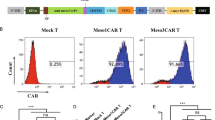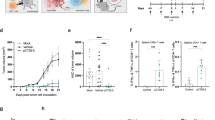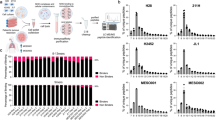Abstract
Mesothelin has been implicated as a potential ideal target antigen for the development of antigen-specific cancer immunotherapy for the control of mesothelin-expressing cancers such as ovarian cancer, mesothelioma and pancreatic adenocarcinoma. In the current study, we utilized a DNA vaccine encoding human mesothelin (pcDNA3-Hmeso) to treat C57BL/6 mice challenged with luciferase-expressing, Hmeso-expressing ovarian cancer cell line, Defb29 Vegf-luc/Hmeso. The therapeutic effect of the tumor-challenged mice was followed by noninvasive bioluminescence imaging systems. The mechanism of the antitumor effect was characterized by depletion of subsets of lymphocytes as well as adopted transfer of serum from pcDNA3-Hmeso-vaccinated mice. We found that vaccination with pcDNA3-Hmeso DNA vaccine generates a significant antitumor effect and promotes survival in mice challenged with Defb29 Vegf-luc/Hmeso. Furthermore, we found CD4+ and CD8+ T-cell immune responses as well as the humoral immune responses are important for the observed antitumor effects in vaccinated mice. Our data indicated that vaccination with DNA vaccine targeting Hmeso could generate potent antitumor effects against mesothelin-expressing tumors through both T cell-mediated immunity as well as antibody-mediated immunity.
This is a preview of subscription content, access via your institution
Access options
Subscribe to this journal
Receive 12 print issues and online access
$259.00 per year
only $21.58 per issue
Buy this article
- Purchase on Springer Link
- Instant access to full article PDF
Prices may be subject to local taxes which are calculated during checkout








Similar content being viewed by others
References
Greenlee RT, Murray T, Bolden S, Wingo PA . Cancer statistics, 2000. CA Cancer J Clin 2000; 50: 7–33.
Zellos LS, Sugarbaker DJ . Multimodality treatment of diffuse malignant pleural mesothelioma. Semin Oncol 2002; 29: 41–50.
Nowak AK, Lake RA, Kindler HL, Robinson BW . New approaches for mesothelioma: biologics, vaccines, gene therapy, and other novel agents. Semin Oncol 2002; 29: 82–96.
Jhala N, Jhala D, Vickers SM, Eltoum I, Batra SK, Manne U et al. Biomarkers in diagnosis of pancreatic carcinoma in fine-needle aspirates. Am J Clin Pathol 2006; 126: 572–579.
Shedlock DJ, Weiner DB . DNA vaccination: antigen presentation and the induction of immunity. J Leukoc Biol 2000; 68: 793–806.
Pardoll DM, Beckerleg AM . Exposing the immunology of naked DNA vaccines. Immunity 1995; 3: 165–169.
Moniz M, Ling M, Hung CF, Wu TC . HPV DNA vaccines. Front Biosci 2003; 8: d55–d68.
Donnelly JJ, Ulmer JB, Shiver JW, Liu MA . DNA vaccines. Annu Rev Immunol 1997; 15: 617–648.
Hung CF, Wu TC . Improving DNA vaccine potency via modification of professional antigen presenting cells. Curr Opin Mol Ther 2003; 5: 20–24.
Boyd D, Hung CF, Wu TC . DNA vaccines for cancer. Drugs 2003; 6: 1155–1164.
Scholler N, Fu N, Yang Y, Ye Z, Goodman GE, Hellstrom KE et al. Soluble member(s) of the mesothelin/megakaryocyte potentiating factor family are detectable in sera from patients with ovarian carcinoma. Proc Natl Acad Sci USA 1999; 96: 11531–11536.
Yen MJ, Hsu CY, Mao TL, Wu TC, Roden R, Wang TL et al. Diffuse mesothelin expression correlates with prolonged patient survival in ovarian serous carcinoma. Clin Cancer Res 2006; 12: 827–831.
Argani P, Iacobuzio-Donahue C, Ryu B, Rosty C, Goggins M, Wilentz RE et al. Mesothelin is overexpressed in the vast majority of ductal adenocarcinomas of the pancreas: identification of a new pancreatic cancer marker by serial analysis of gene expression (SAGE). Clin Cancer Res 2001; 7: 3862–3868.
Robinson BW, Creaney J, Lake R, Nowak A, Musk AW, de Klerk N et al. Mesothelin-family proteins and diagnosis of mesothelioma. Lancet 2003; 362: 1612–1616.
Hassan R, Bera T, Pastan I . Mesothelin: a new target for immunotherapy. Clin Cancer Res 2004; 10: 3937–3942.
Ho M, Hassan R, Zhang J, Wang QC, Onda M, Bera T et al. Humoral immune response to mesothelin in mesothelioma and ovarian cancer patients. Clin Cancer Res 2005; 11: 3814–3820.
Suarez-Alvarez B, Garcia Suarez MM, Arguelles ME, Sampedro A, Alvarez Marcos C, Mira E et al. Circulating IgG response to stromelysin-3, collagenase-3, galectin-3 and mesothelin in patients with pharynx/larynx squamous cell carcinoma. Anticancer Res 2001; 21: 3677–3684.
Hung CF, Tsai YC, He L, Coukos G, Fodor I, Qin L et al. Vaccinia virus preferentially infects and controls human and murine ovarian tumors in mice. Gene Ther 2007; 14: 20–29.
Mendiratta SK, Thai G, Eslahi NK, Thull NM, Matar M, Bronte V et al. Therapeutic tumor immunity induced by polyimmunization with melanoma antigens gp100 and TRP-2. Cancer Res 2001; 61: 859–863.
Steitz J, Bruck J, Steinbrink K, Enk A, Knop J, Tuting T . Genetic immunization of mice with human tyrosinase-related protein 2: implications for the immunotherapy of melanoma. Int J Cancer 2000; 86: 89–94.
Lu Y, Wei YQ, Tian L, Zhao X, Yang L, Hu B et al. Immunogene therapy of tumors with vaccine based on xenogeneic epidermal growth factor receptor. J Immunol 2003; 170: 3162–3170.
Wei YQ, Huang MJ, Yang L, Zhao X, Tian L, Lu Y et al. Immunogene therapy of tumors with vaccine based on Xenopus homologous vascular endothelial growth factor as a model antigen. Proc Natl Acad Sci USA 2001; 98: 11545–11550.
Forconi F, King CA, Sahota SS, Kennaway CK, Russell NH, Stevenson FK . Insight into the potential for DNA idiotypic fusion vaccines designed for patients by analysing xenogeneic anti-idiotypic antibody responses. Immunology 2002; 107: 39–45.
Weber LW, Bowne WB, Wolchok JD, Srinivasan R, Qin J, Moroi Y et al. Tumor immunity and autoimmunity induced by immunization with homologous DNA. J Clin Invest 1998; 102: 1258–1264.
Steitz J, Bruck J, Gambotto A, Knop J, Tuting T . Genetic immunization with a melanocytic self-antigen linked to foreign helper sequences breaks tolerance and induces autoimmunity and tumor immunity. Gene Ther 2002; 9: 208–213.
Johnen H, Kulbe H, Pecher G . Long-term tumor growth suppression in mice immunized with naked DNA of the human tumor antigen mucin (MUC1). Cancer Immunol Immunother 2001; 50: 356–360.
Su JM, Wei YQ, Tian L, Zhao X, Yang L, He QM et al. Active immunogene therapy of cancer with vaccine on the basis of chicken homologous matrix metalloproteinase-2. Cancer Res 2003; 63: 600–607.
Hawkins WG, Gold JS, Dyall R, Wolchok JD, Hoos A, Bowne WB et al. Immunization with DNA coding for gp100 results in CD4 T-cell independent antitumor immunity. Surgery 2000; 128: 273–280.
Leitner WW, Hwang LN, deVeer MJ, Zhou A, Silverman RH, Williams BR et al. Alphavirus-based DNA vaccine breaks immunological tolerance by activating innate antiviral pathways. Nat Med 2003; 9: 33–39.
Niethammer AG, Xiang R, Becker JC, Wodrich H, Pertl U, Karsten G et al. A DNA vaccine against VEGF receptor 2 prevents effective angiogenesis and inhibits tumor growth. Nat Med 2002; 8: 1369–1375.
Luo Y, Zhou H, Mizutani M, Mizutani N, Reisfeld RA, Xiang R . Transcription factor Fos-related antigen 1 is an effective target for a breast cancer vaccine. Proc Natl Acad Sci USA 2003; 100: 8850–8855.
Niethammer AG, Primus FJ, Xiang R, Dolman CS, Ruehlmann JM, Ba Y et al. An oral DNA vaccine against human carcinoembryonic antigen (CEA) prevents growth and dissemination of Lewis lung carcinoma in CEA transgenic mice. Vaccine 2001; 20: 421–429.
Xiang R, Lode HN, Chao TH, Ruehlmann JM, Dolman CS, Rodriguez F et al. An autologous oral DNA vaccine protects against murine melanoma. Proc Natl Acad Sci USA 2000; 97: 5492–5497.
Conejo-Garcia JR, Benencia F, Courreges MC, Kang E, Mohamed-Hadley A, Buckanovich RJ et al. Tumor-infiltrating dendritic cell precursors recruited by a beta-defensin contribute to vasculogenesis under the influence of Vegf-A. Nat Med 2004; 10: 950–958.
Hung CF, Calizo R, Tsai YC, He L, Wu TC . A DNA vaccine encoding a single-chain trimer of HLA-A2 linked to human mesothelin peptide generates anti-tumor effects against human mesothelin-expressing tumors. Vaccine 2007; 25: 127–135.
Chen CH, Wang TL, Hung CF, Yang Y, Young RA, Pardoll DM et al. Enhancement of DNA vaccine potency by linkage of antigen gene to an HSP70 gene. Cancer Res 2000; 60: 1035–1042.
Jasinska J, Wagner S, Radauer C, Sedivy R, Brodowicz T, Wiltschke C et al. Inhibition of tumor cell growth by antibodies induced after vaccination with peptides derived from the extracellular domain of Her-2/neu. Int J Cancer 2003; 107: 976–983.
Acknowledgements
We thank Dr Richard Roden for helpful discussions. We acknowledge Archana Monie and Talia Hoory for the preparation of the manuscript. This work was supported by ovarian cancer grants from the Alliance for Cancer Gene Therapy (ACGT) and the NCDGG (1U19 CA113341-01).
Author information
Authors and Affiliations
Corresponding author
Rights and permissions
About this article
Cite this article
Chang, CL., Wu, TC. & Hung, CF. Control of human mesothelin-expressing tumors by DNA vaccines. Gene Ther 14, 1189–1198 (2007). https://doi.org/10.1038/sj.gt.3302974
Received:
Revised:
Accepted:
Published:
Issue Date:
DOI: https://doi.org/10.1038/sj.gt.3302974



